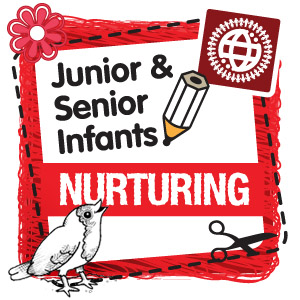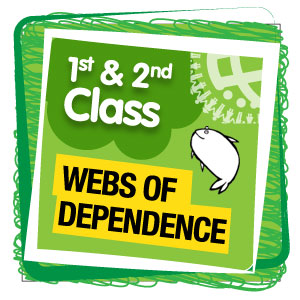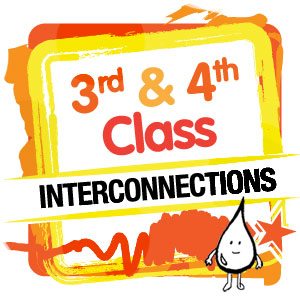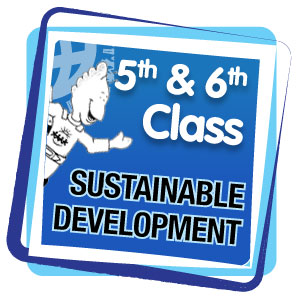Team Planet: An Action Pack on Ourselves and the World
Team Planet is an active learning programme focused on the themes of environment and interdependence designed for use at individual class levels but also on a whole-school basis.
Core to the programme is the notion of the connectedness and interdependence of all people, systems and cycles of life.
While each level of the programme is self-contained and can be delivered on a stand alone basis, the full benefits of the programme will be realised if all levels are implemented throughout the school in a systematic and linked manner.
The programme is divided into four levels: Level 1: Naionain Shoisearacha & Naionain Shinsearacha; Level 2: Rang I & Rang II; Level 3: Rang III & Rang IV – with a specific focus at each level on one key concept.
The four key concepts, Nurturing, Webs of Dependence, Interconnections and Sustainable Development are explored and developed using cross-curricular themes.
Introduction
The fragility of the planet’s ecosystem is one issue of greatest concern to human health and well-being in the 21st Century. The depletion of the ozone layer, atmospheric warming, rainforest destruction, desertification and the accelerating loss of animal and plant species together with the growing deprivation of the world’s poor represent an unprecedented threat to the very future of life on this planet.
Translating this concern into an educational response is the challenge which has inspired Team Planet.
Team Planet seeks to contribute to the ideal of sustainable development through the provision of structured materials and activities for pupils at all levels of the primary/elementary school. Highlighting that our own lives are directly connected to and supported by the systems which govern life on Planet Earth, this programme seeks to facilitate attitudinal awareness and behavioural change which foster harmonious co-existence with the Earth, all her people and systems. The programme also seeks to facilitate an understanding of social justice, peace and development as prerequisites for such co-existence.
Hence, Team Planet explores and develops four key concepts:
- Nurturing
- Dependence
- Interconnections
- Sustainable Development.
Team Planet embraces the ideal of child-centred, activity-based learning by encouraging students to develop their awareness and understanding; to hold opinions and to take appropriate responsibility for the shape and direction of their own learning. The programme is designed to engage pupils’ hearts and minds in active processes of analysis, synthesis, debate and decision-making. It aims to promote an understanding of global environmental issues and develop a personal code of environmental ethics.
Team Planet offers teachers an avenue to addressing some of the vital issues we all face in the years ahead and helps pupils seek their own path towards a more harmonious relationship with the Earth and all her inhabitants.
We hope you enjoy using Team Planet as much as we have enjoyed developing it.
Kathleen Horgan
Limerick, Ireland
May 2011

Junior & Senior Infants
Theme: Nurturing
Naíonáin Shóisearcha – Things I need, Things which need me
The theme is explored using a story that has two parts.
The first part of the story is based around the friendship of an owl and a tree that live in a forest together. They learn that through their friendship they can help each other. Oisín Oak provides a home for Uná Owl and other creatures that were in need of homes. Uná Owl and the other creatures become Oisín Oak’s friends, and he no longer feels lonely.
The second part of the story features Áodh and Aisling, two children from Baile Glas who enjoy spending time in the forest and especially with Oisín Oak. Áodh, Aisling and the forest trees and creatures are very upset when villagers from Baile Glas start cutting down trees in the forest. They call upon Labhraidh Leprechaun for help. Labhraidh Leprechaun puts a plan in action to make the villagers realise how important the forest is and how important it is that they care for it. Labhraidh’s plan is successful and the villagers of Baile Glas promise to take good care of the forest in future and live in harmony with the trees and animals there.
Each episode of the story is explored through activities including: Storytime, Imagination/creative games, Amhranaoícht, Poetry, Art & Craft, Drama & mime, Nature Walks, Active/outdoor games, Matching games
Naíonáin Shinsearacha – Caring for the Earth in Other Lands
This theme uses a photopack of 20 photographs of children from around the world. The images focus on family, school, work, caring and play. The activities aim to assist the children in exploring the similarities and differences between their life and the lives or others around the world. This theme hopes to develop greater openness and encourage the children to question stereotypical perceptions regarding people and life in other places.
The activities involve the use of the photopack and photographs selected by the teacher or the children themselves. The use of photographs encourages the children to think about, and question, the images that they are presented with.
Each activity involves the use of photographs. The activities also incorporate: Memory games, Developing stories, Art & Craft, Drama, Cooking, Category games.

1st and 2nd Class
Theme: Webs of Independence
Key ideas:
Rang 1: Habitats
The theme is based around a story which traces the journey down river of two children who live on a barge. During their journey they encounter many river creatures whose lives are endangered because of pollution and habitat destruction. The children feel compelled to act on behalf of their new found friends and set about enlightening the townspeople about the harmful consequences of their actions.
Each episode of the story is explored through activities and worksheets which introduce concepts such as food chains, habitat, interdependence and pollution, while highlighting the dangers of irresponsible action towards the environment and motivating students to become more environmentally aware and ecologically concerned.
Rang 2: Our Food Web (2nd Class)
This theme uses a variety of group activities, stories, mapping exercises, posters and survey sheets to help pupils understand the vast network of people involved in providing us with food and thereby appreciate the nature of our dependence on the global community.
The activities which comprise this theme encourage the pupils to distinguish between needs and wants, identify different food types, explore a range of eating habits and customs throughout the world, trace the journey of foods from producer to distributor and recognise that much of the food which we eat is produced by people in distant lands.
Activities include – ‘The Food We Eat’, ‘The People I Need’, ‘Breakfast Around the World’, ‘The Banana Story’, ‘Breakfast Trail’, ‘Supermarket Visit’ etc.

3rd & 4th Class
Theme: Interconnections
Key ideas:
Rang 3: Nature, the Great Recycler
This theme seeks to promote an understanding of the delicate cycles of nature where energy and materials are continually exchanged and recycled. Through a range of group activities, role plays, stories, games and worksheets, the theme helps to foster an understanding of the word ‘environment’; introduce the concept of ‘food chains’; illustrate how energy is passed from one link in the chain to the next; promote and understanding of the interdependence between people and nature; and alert pupils to the “domino effect” which results when links in the food chains become polluted.
This theme forms an ideal springboard for the exploration of the concepts and issues which are addressed in the succeeding theme ‘Wasting Away’
Activities include – ‘Essential Choices’, ‘Surrounded’, ‘What is Energy?’, ‘Sources of Energy’, ‘Pass it On’, ‘Ar Stailc’, ‘VIPs – Very Important Particles’, ‘Particles in Peril’ etc.
Rang 4: Wasting Away
The theme involves pupils in concrete activities where they observe, record and evaluate the amount of waste in their environment. The results of their waste surveys are compiled, displayed, and form the basis for awareness raising activities in the school and in the locality.
Issues relating to the dangers of careless disposal of waste and the benefits of conservation and recycling are raised with reference to practices in other countries.
Finally, the problem of waste as an integral part of modern living is highlighted when a Stone Age child reflects on the similarities and differences between past and present ways of living.
Activities include – ‘What a Waste’, ‘Ag Faire ar an mBruscar’, ‘Me, a Litter Lout, Never!’, ‘Cén Aois Mé’, ‘Plastic is Forever’, ‘Nature’s Recyclers’, ‘The Green Scene’, ‘Equal Shares’, ‘Stone Crazy’ etc.

5th & 6th Class
Theme: Sustainable Development
Key ideas:
Rang 5: Trees
The theme highlights the importance of trees in the environment and encourages pupils to adopt attitudes and behaviours which promote tree conservation and management. The activities encourage pupils to gain a deeper insight into the properties and physical characteristics of trees. The activities also explore the relationship between people’s attitudes to the environment and their treatment of it, the global distribution of trees, the characteristics of the rainforest ecosystem, rainforest destruction and actions for the preservation and protection of trees.
The 20 activities involve: activities, Reading exercises, Creative writing, Letter writing, Group discussions, Pair work, Picture exercises
Sample activities – ‘How Tall is your Tree’, ‘Fruits of the Forest’, ‘An Timpeallacht: Tuairmi Daoine Eile’, ‘Why cut down the Trees?’, ‘The Planning Game’
Rang 6: Earthlinks
This theme focuses on the links between people and the planet. The character Eddie Earthlink features throughout the activities. The principles of sustainable and unsustainable actions are explored. The concept of justice and the rights of future generations are also addressed. The activities aim to encourage pupils to discover how the daily actions of individuals, communities and society relate to the environment. Pupils are encouraged to recognise and support environmentally friendly actions.
The 27 activities involve: Outdoor activities, Reading exercises, Creative writing, Letter writing, Group discussions, Pair work, Picture exercises, Poster making
Resources include – ‘A Fragile Planet’, ‘The Rights of Future Generations’, ‘Towards a more Just Planet’, ‘Link the world in 80 Ways’
